Seventeen different translations of the Bible were 'data
mined' using a computer to search for terms such as: tax;
taxes; tax collector; toll; custom; coin; tribute; money; etc,
...and Jesus. Other topics can also be found quickly,
e.g. Moses and commandments, Joseph & Pharaoh, or Herod
& John the Baptist, etc.
The
question here is "Who would Jesus tax?"
  Why Jesus & Taxes?
Why Jesus & Taxes?
1. Criminal Charges
What charges were made against Jesus the Christ?
"They began to accuse him,
saying, "We found this man perverting the nation, forbidding
paying taxes to Caesar, and saying that he himself is Christ,
a king." - Luke
23:2
Depending on which Bible translation
you read, there were two or three charges made against Jesus.  • Charge 1: "perverting the nation"
• Charge 1: "perverting the nation"
pervert:
to turn upside down, overturn, overthrow. Source: LawyerIntl.com
• Charge 2: "forbidding paying
taxes to Caesar"
forbid: to
command [someone] not to. Source: OneLook Dictionary
• Charge 3: "saying that he
himself is Christ, a king."
Christ:
messiah, the expected king and deliverer. Source: Merriam-Webster
Christ:
the Anointed; Savior of the World; Source: Webster's 1828 Dictionary
King of the Jews?
During trial, Pilate, the judge, asked Jesus "Are you king of the Jews?"
 Jesus replied, "My kingdom is not of this world." - John 18:36 Jesus replied, "My kingdom is not of this world." - John 18:36
So, is there any evidence for charges of a tax crime?
Was Jesus really a tax protester ... perverting the nation by leading a tax rebellion?
 Fact: Jesus had a trial for tax crimes ... where he was charged with "perverting" or "subverting the nation", and "forbidding paying taxes". Fact: Jesus had a trial for tax crimes ... where he was charged with "perverting" or "subverting the nation", and "forbidding paying taxes".
How to Search your Bible with a computer:
- A good Bible study tool for searching through Bible verses is Bible.cc (which currently has 17 versions), or simply use your favorite Bible study search tools.
- Find all Bible verses for tax. Also look for related
terms, such as taxes, custom, customs, toll, tolls, tribute,
tributes, tax collector, ...etc.
- Make a list of these tax related bible verses, include names and numbers.
- Read each verse to see if the words came from Jesus.
- Also read each translation (of all 17
versions) to compare bible verses. This will help you find related search terms.
- Determine if evidence exists to support the charge Jesus was "subverting the nation" and "forbidding
paying taxes".
  What did Jesus teach about taxes?
What did Jesus teach about taxes?
2. Tax Collectors
"If your brother sins against you, go and show him his fault ... if he will not listen,
take one or two others along, so that every matter may be established by the testimony of two or three witnesses. If he refuses to listen
to them, tell it to the church; and if he refuses to listen even to the church, treat him as you would a pagan or a tax collector."
- Matthew 18:15
Jesus taught others that tax collectors should be shunned and avoided.
Who is Taxed?
When tax collectors came to collect money, they believed Jesus was avoiding them. So, they asked his companion Simon, "doesn't he pay his taxes?" Simon said, "Yes". But Jesus stopped Simon and asked...
 "What
do you think, Simon? From whom do kings on the earth collect tolls
or tributes? From their own subjects, or from foreigners?" When
he said, "From foreigners," Jesus said to him, "In that case,
the subjects are exempt."
-Matthew
17:25-27 (ISV) "What
do you think, Simon? From whom do kings on the earth collect tolls
or tributes? From their own subjects, or from foreigners?" When
he said, "From foreigners," Jesus said to him, "In that case,
the subjects are exempt."
-Matthew
17:25-27 (ISV)
 Fact: Jesus said tax foreigners, because "the subjects are exempt." Fact: Jesus said tax foreigners, because "the subjects are exempt."
 According to Jesus, "subjects are exempt" from paying taxes to "kings on the earth." According to Jesus, "subjects are exempt" from paying taxes to "kings on the earth."
- Who are the subjects?
Subjects
are citizens, those who are subjected to the rule of another, as were Simon and Jesus.
Subjects: Cambridge Dictionary
- Who would Jesus tax?
Jesus taught, "kings on the earth" should
only tax "foreigners".
Other translations include...
- "Do kings tax their own people or the people they have conquered?" - Matthew
17:25-27 (NLT)
- "their own children, or of strangers?" (KJB)
- "Therefore the children are exempt"
(WEB)
- "Really, then, the sons are tax-free"
(NWT)
Notice Jesus said "we"...
"the subjects are exempt.
However, so that we don't offend them..."
(ISV)
So, Jesus considered himself, and Simon, to be "subjects" of the king. And so, regardless of any Bible translation (whether "sons" or "children"), both he and Simon were, according to Jesus, exempt from paying taxes to the king.
 Wasn't this about paying a temple tax?
Wasn't this about paying a temple tax? 
  Jesus asked about taxes collected by "kings on
the earth"
Jesus asked about taxes collected by "kings on
the earth"  (i.e. earthly governments). (i.e. earthly governments).
 Kings don't have to pay taxes.
Kings don't have to pay taxes.
Some have said since Jesus was a king, or the son of a king, he
didn't have to pay taxes. But ...
 Jesus said "My kingdom is not of this world."
- John 18:36
Jesus said "My kingdom is not of this world."
- John 18:36
This would make Jesus a "foreigner",
or "stranger", which in his own teaching meant taxpayer.

Jesus then tells Simon to go catch a fish and in its mouth there
will be a coin for the tax payment. Then Jesus says "give it to
them for me and you."
 So, Jesus paid taxes to "kings on the earth." So, Jesus paid taxes to "kings on the earth."
 Some have used this fish story to say that Jesus paid taxes. This
is hardly a feasible example to teach people, since Jesus did
not actually pay this tax from his earnings or his purse (unless he had a habit of using a fish for his secret purse). Specifically, it would not change what Jesus actually taught Simon, that earthly "kings" should tax "foreigners", because "the subjects are exempt."
Some have used this fish story to say that Jesus paid taxes. This
is hardly a feasible example to teach people, since Jesus did
not actually pay this tax from his earnings or his purse (unless he had a habit of using a fish for his secret purse). Specifically, it would not change what Jesus actually taught Simon, that earthly "kings" should tax "foreigners", because "the subjects are exempt."
 But, Simon had already committed Jesus to pay the tax.
But, Simon had already committed Jesus to pay the tax.
 Some say Jesus did not want to "offend them",
because Simon already told these tax collectors, Jesus would pay. But notice, the tax collectors believed Jesus was trying to avoid them. They actually had to ask Simon about his tax paying habits. It appears Jesus was avoiding these collectors, and did not intend to pay, if they had to ask "Doesn't he pay taxes."
Some say Jesus did not want to "offend them",
because Simon already told these tax collectors, Jesus would pay. But notice, the tax collectors believed Jesus was trying to avoid them. They actually had to ask Simon about his tax paying habits. It appears Jesus was avoiding these collectors, and did not intend to pay, if they had to ask "Doesn't he pay taxes."
Other bible translations say
• "we don't want to create a scandal"
• "be a cause of trouble"
• "cause them to stumble"
In other words, Jesus did not want these tax collectors to fail to collect (stumble), since he and Simon could be reported to authorities for non-payment of taxes (which then might create a scandal, and offend them).
Jesus used a question to teach that taxes belong upon "foreigners."
Foreigners are people who do not add to, or contribute to, the
kingdom's economy, unless they are taxed.
 It's also possible these tax collectors overheard Jesus telling Simon this
tax lesson, and reported Jesus for being a tax protester. Maybe
Jesus even asked these tax collectors the same question... It's also possible these tax collectors overheard Jesus telling Simon this
tax lesson, and reported Jesus for being a tax protester. Maybe
Jesus even asked these tax collectors the same question...
"Tax collectors, What do you think? ... From whom do kings on the earth collect
tolls or tributes?"
 Who was Jesus teaching?
Who was Jesus teaching?
 3.
Fisher of Men, School for Tax Collectors 3.
Fisher of Men, School for Tax Collectors
"Now the tax-gatherers and
the notorious sinners were everywhere in the habit of coming close
to Him to listen to Him;" -
Luke 15:1 (WNT)
Other Bible translations say...
 Fact: Jesus was perverting or subverting the nation's tax collectors, and was teaching to tax collectors ... "all" of them. Tax collectors where "everywhere", and it was their "habit". Fact: Jesus was perverting or subverting the nation's tax collectors, and was teaching to tax collectors ... "all" of them. Tax collectors where "everywhere", and it was their "habit".
If this was indeed a habit of tax collectors, and they "kept coming to listen to Jesus", then this fact alone was enough to fulfill the charge of subverting the nation. If all the tax collectors were regularly present, its likely that at least one pointed the finger at Jesus during trial. Money talks, many obey.
All Tax Collectors?
 Yes. Notice,
most Bibles (14 out of 17 translations) say "all" the tax collectors were regularly spending a lot of time listening to Jesus. Yes. Notice,
most Bibles (14 out of 17 translations) say "all" the tax collectors were regularly spending a lot of time listening to Jesus.
 If having "all the tax collectors" stop working, regularly, was not considered "perverting" or "subverting the nation" by Roman authorities (or any government), as Jesus was officially charged, then what would be? If having "all the tax collectors" stop working, regularly, was not considered "perverting" or "subverting the nation" by Roman authorities (or any government), as Jesus was officially charged, then what would be?
 With whom did Jesus congregate?
With whom did Jesus congregate?
4. Friends of Jesus
According to Matthew, Jesus' disciple, and a tax collector, Jesus was known as ...
'a friend of tax collectors and
sinners!' - Matthew
11:19
 Fact: Jesus was famous for having tax collector friends.
Fact: Jesus was famous for having tax collector friends.
 What did Jesus think about tax collectors? What did Jesus think about tax collectors?
"Why do you eat and drink
with the tax collectors and sinners?" And Jesus answered
and said to them, "It is not those who are well who need
a physician, but those who are sick." - Luke
5:30-31
 Jesus said tax collectors are "sick."
Jesus said tax collectors are "sick."
Why would Jesus consider tax collectors to be sick?
Was it because of God's commandment Thou shall not steal? ... Or, because of the First Commandment, that they chose to serve another god, called Caesar, ... mammon, god of money?
 Why charge Jesus with a tax crime?
Why charge Jesus with a tax crime?
5. Perverting Tax Collectors - Subverting Internal Revenue
 A. One possible reason for Jesus' perverting or tax charge was Zacchaeus,
a chief tax collector.
A. One possible reason for Jesus' perverting or tax charge was Zacchaeus,
a chief tax collector.
 Interfering with a chief tax collector's duties could
explain why Jesus was charged with a tax crime. Interfering with a chief tax collector's duties could
explain why Jesus was charged with a tax crime.
Zacchaeus believed that he himself had done wrong, so he gave
half of his "goods" to the poor in an attempt
to heal his own sickness. In addition, Zacchaeus knew he had stolen
property for himself, as well as tribute for Caesar. He told Jesus...
"If I have wrongfully exacted
anything of anyone, I restore four times as much." -
Luke 19:8
(WEB)
Zacchaeus, a chief tax collector, was probably responsible for producing
significant revenues for the Roman government. So, to have Zacchaeus
returning half of Caesar's tributes, plus his own commissions (interest),
to the subjects (taxpayers) would have set a bad example to his
junior tax collectors. And, many tax collectors would
have been upset with Zacchaeus, and Jesus, for initiating unwelcome tax refunds, costing them their hard-earned money, which they had already
taken (exacted, stolen, forced) from 'taxpayers'.
 B. A second possible reason for Jesus's perverting or tax charge was Matthew,
another tax collector who became Jesus' disciple.
B. A second possible reason for Jesus's perverting or tax charge was Matthew,
another tax collector who became Jesus' disciple.
 Jesus was disrupting the government, causing problems with the Roman IRS by convincing
(perverting) tax collectors to follow him. And, Matthew took him up on this offer. Jesus was disrupting the government, causing problems with the Roman IRS by convincing
(perverting) tax collectors to follow him. And, Matthew took him up on this offer.
"As Jesus went on from there,
He saw a man called Matthew, sitting in the tax collector's booth;
and He said to him, "Follow Me!" And he got up and followed
Him." - Matthew
9:9
Matthew, a tax collector, abandoned his collecting duties (and gave up a well paying job) in order to follow
Jesus. Apparently, many other tax collectors may have also abandoned their
duties, since, "the tax collectors and sinners kept
coming to listen to Jesus". - Luke 15:1 (ISV)
What do you think Matthew's boss said to his boss about
Matthew abandoning his duty? And, after the head-boss, Pilate,
found out, surely some of these tax collectors also ended up hanging
from crosses. (Maybe it was a tax collector hanging on the cross
next to Jesus, the week before, and the week after.)
 C. A third possible reason for a perverting or tax charge may have been what Jesus was teaching about tax collectors. C. A third possible reason for a perverting or tax charge may have been what Jesus was teaching about tax collectors.
"If your brother sins against you, go and show him his fault ... if he will not listen,
take one or two others along, so that every matter may be established by the testimony of two or three witnesses. If he refuses to listen
to them, tell it to the church; and if he refuses to listen even to the church, treat him as you would a pagan or a tax collector."
- Matthew 18:15
Jesus taught that tax collectors should be avoided, like pagans.
Notice, tax revenues will suffer, if people are taught they should avoid and reject tax collectors.
  This could be the basis
of the first two charges against Jesus. The first, "perverting the nation" Luke 23:2, by teaching people to shun tax collectors, which apparently, the people already knew how to properly treat. And, second, "forbidding paying taxes". This could be the basis
of the first two charges against Jesus. The first, "perverting the nation" Luke 23:2, by teaching people to shun tax collectors, which apparently, the people already knew how to properly treat. And, second, "forbidding paying taxes".
Guilty of Subverting? Perverting?
 Simply getting Matthew and Zacchaeus, a tax collector, and a chief tax collector, to stop work collecting taxes, even returning taxes to taxpayers, was enough to have Jesus charged with "perverting the nation" and "forbidding paying taxes", not to mention, "all the tax collectors" frequently skipped work to listen to Jesus speak. Luke 15:1 Simply getting Matthew and Zacchaeus, a tax collector, and a chief tax collector, to stop work collecting taxes, even returning taxes to taxpayers, was enough to have Jesus charged with "perverting the nation" and "forbidding paying taxes", not to mention, "all the tax collectors" frequently skipped work to listen to Jesus speak. Luke 15:1
Jesus was going around the country trashing the reputation and profession of tax collecting, while attempting to heal "sick" tax collectors - something the chief tax man for Rome, Pilate, did not appreciate.
Chief Tax Man, Pontius Pilate (local 'IRS' head)
Pontius
Pilate, was the Roman prefect and the head man in charge of collecting
taxes for Rome.
 "The procurators' and prefects' primary functions were
military, but as representatives of the empire they were responsible
for the collection of imperial taxes" - http://en.wikipedia.org/wiki/Pilate "The procurators' and prefects' primary functions were
military, but as representatives of the empire they were responsible
for the collection of imperial taxes" - http://en.wikipedia.org/wiki/Pilate
"And it came to pass in those days, that there went out a decree from Caesar Augustus, that all the world should be taxed." - Luke 2:1 (King James Bible)
Census Tax? Only King James Bible and Webster's Bible mention this decree from Caesar to impose taxes on the world. Other
Bible translations only mention that a census was to be taken. (So now we see the original reason for a census. The property owners, the masters, are simply calculating the value of their property, the tax slaves, so tax revenues can be estimated and later verified.)
Pilate must have known that many of his imperial tax collectors
were leaving their collecting jobs to follow Jesus, since his followers included Matthew, and other tax collectors who were "in the habit" of listening to him. Pilate would have noticed
a lack of tax revenues coming into tribute headquarters, and would
have investigated a decline in tax revenues. And, he would have
been very angry with Jesus for teaching tax collectors anything
which contradicts imperial taxation. And for using parables that put tax collectors
in the same category as prostitutes.
"Truly I say to you that the
tax collectors and prostitutes will get into the kingdom of God
before you." - Matthew
21:31
Is this why tax collectors were "everywhere in the habit
of coming close to Him to listen"? Because their own
guilty feelings brought them to Jesus?
Jesus used parables to teach people. In this parable, he placed tax collectors
in the same group as "swindlers", "adulterers" and the "unjust"...
"The Pharisee stood and was
praying this to himself: "God,
I thank You that I am not like other people: swindlers, unjust,
adulterers, or even like this tax collector."
- Luke
18:11
 If Jesus taught that tax collectors should be treated like pagans, then Pilate may have learned, from some of his loyal tax collectors, that Jesus didn't speak too highly of "giving" to Caesar. If Jesus taught that tax collectors should be treated like pagans, then Pilate may have learned, from some of his loyal tax collectors, that Jesus didn't speak too highly of "giving" to Caesar.
If Zacchaeus, a chief tax collector had "wrongfully
exacted" taxes, and harassed citizens, then it's very
likely many of his junior tax collectors also followed his
lead and wrongfully exacted taxes (an organized crime).
However, Jesus wasn't the only one who believed tax collectors were sick sinners. According to Luke, this belief about tax collectors may have been common.
"He has gone to be the guest of a sinner." - Luke 19:7
 On which topic was Jesus given a "test"?
On which topic was Jesus given a "test"?
6. Rendering unto Mammon? ... Can we serve both God and money?
"The Pharisees went and took counsel how they might entrap
him in his talk.
They sent their disciples to him, along with the Herodians, saying,
"Teacher, we know that you are honest, and teach the way
of God in truth, no matter who you teach, for you aren't partial
to anyone.
|
Tell us therefore, what do you think? Is it lawful [i.e. against the first and second commandment] to pay taxes
to Caesar, or not?"
But Jesus perceived their wickedness, and said, "Why do you test me, you hypocrites? [He called them hypocrites, because regardless of how he answered, they had already chosen to serve two masters, or two gods. They already possessed Caesar's tax coin, themselves.]
Show me the tax money." They brought to him a denarius [tax coin].
He asked them, "Whose is this image and inscription?" |
Render unto Mammon?
God of money?
Is it lawful?
God of Money and Wealth.
But Jesus said, "You cannot serve both God and Mammon." Caesar's tax coin inscription claimed he was
Son of god, i.e. another god, the god of money - which is against first and second commandments - "No other gods", and no "graven images."
- Exodus 20:1
|
 They said to him, "Caesar's." Then he said to them,
"Give therefore to Caesar the things that are Caesar's, and
to God the things that are God's." - Matthew
22:15-21 (WEB) They said to him, "Caesar's." Then he said to them,
"Give therefore to Caesar the things that are Caesar's, and
to God the things that are God's." - Matthew
22:15-21 (WEB)
Some bible translations say "Render" unto Caesar.
Render: To pay back; to restore. Webster Dictionary, 1913.
 Did Jesus change his mind, and now agree to have two gods, and serve two masters? Or did he wish to restore, and return back Caesar's things to Caesar, choosing to serve God, instead of money and a god he called mammon? Did Jesus change his mind, and now agree to have two gods, and serve two masters? Or did he wish to restore, and return back Caesar's things to Caesar, choosing to serve God, instead of money and a god he called mammon?
Luke goes on to say...
"They couldn't make him say anything
wrong in front of the people. His answer surprised them, so they
said no more." - Luke
20:26 (GWT)
 Tax Test. Was Jesus considered a tax expert? Jesus was tested on taxation, which is service and labor to another. According to Luke 15, Jesus was frequently surrounded by "all the tax collectors", and because of this he was probably considered the local tax law expert.
Tax Test. Was Jesus considered a tax expert? Jesus was tested on taxation, which is service and labor to another. According to Luke 15, Jesus was frequently surrounded by "all the tax collectors", and because of this he was probably considered the local tax law expert.
Jesus was "subverting the nation", using its own tax collectors. In order to trap Jesus, he was given a "test" about paying taxes.
  Things to Caesar? ... Things to God?
Things to Caesar? ... Things to God?
So, was his answer "yes" or "no"?
- Jesus didn't say "yes" or "no".
-
Jesus didn't have a tax coin, like the hypocrite. Why?
- Would Jesus accept Caesar as his god, and pay him a tribute as god?
"Show me a denarius (tax coin). Whose portrait and inscription are on it?"
- Luke 20:24
 This is something every Bible completely fails to mention (and so, is very misleading)... This is something every Bible completely fails to mention (and so, is very misleading)...
  The inscription on the tax coin said The inscription on the tax coin said
Caesar is son of a god.
 So, the question which was really being asked to Jesus, by hypocrites, was ... So, the question which was really being asked to Jesus, by hypocrites, was ...
"Is it lawful to pay tribute (taxes) to Caesar, the man on this coin, who claims he is a god, if the law (first commandment) states we can have no other gods?"
This is an example of the tax coin believed to be seen by Jesus.
Front:
TI[berius] CAESAR DIVI AVG[usti] F[ilius] AVGVSTVS,
"Tiberius Caesar Augustus, son of the Divine Augustus"

Divine: of, or from God or a god, being a deity
Back:
Image of Caesar's mother, Livia, depicted as goddess (Pax), and the inscription:
PONTIF[ex] MAXIM[us], "chief priest"
Another possible candidtate for this tax coin was made by Caesar's father, Augustus.The inscription on his coin said, "Caesar Augustus, Son of God, Father of His Country".

Some believe a different tax coin was shown to Jesus. It's possible this was a Greek coin, known as the Tetradrachm. But this coin also featured other gods, Zeus and Hercules. This is why moneychangers (bankers) were needed. Because a Jew couldn't carry a coin which gave his or her allegiance, and service (tributes), to another god. It was against the first commandment - You shall have no other gods. And, it was also against the second commandment to have no graven images.
Notice, Caesar was rubbing it in the noses of Jews when it came time to pay him a tribute. He was forcing a tax to be paid with his own coins, and so making Jews, and everyone else, regularly declare their willful obedience and recognition to him as god.
The subjects of the Roman Empire had to serve Caesar, as a god. And, pay him tributes (taxes) with a coin declaring it is so.
 Thus the answer given by Jesus was really a choice, for each person to decide for themselves, which god would they serve. But the people who were present already knew Caesar's coin inscriptions very well ("Caesar, Son of God") and understood that Jesus did not say to pay Caesar, but to give back Caesar's system, entirely. Thus the answer given by Jesus was really a choice, for each person to decide for themselves, which god would they serve. But the people who were present already knew Caesar's coin inscriptions very well ("Caesar, Son of God") and understood that Jesus did not say to pay Caesar, but to give back Caesar's system, entirely.
i.e. Have nothing to do with Caesar or his things.
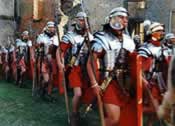 The Jews were, after all, the subjects of Roman occupation; tax slaves. And they were looking for a saviour to free them of this tax service to another God, a Roman Caesar. (And, Jews continued to serve the Caesars for another 30 some years, until 66 AD, or 66 CE, when anti-taxation protests and attacks upon Roman citizens helped produce the first Jewish-Roman war, another tax revolt. Indeed, Jesus' actions may have even contributed significantly to the start of this revolt.) The Jews were, after all, the subjects of Roman occupation; tax slaves. And they were looking for a saviour to free them of this tax service to another God, a Roman Caesar. (And, Jews continued to serve the Caesars for another 30 some years, until 66 AD, or 66 CE, when anti-taxation protests and attacks upon Roman citizens helped produce the first Jewish-Roman war, another tax revolt. Indeed, Jesus' actions may have even contributed significantly to the start of this revolt.)
Jesus simply said, give back Caesar his things, i.e. his whole system. Everything.
Definition: Render: to give back. From Anglo-French rendre. Source: Merriam-Webster
 So notice, Young's Literal Translation ... So notice, Young's Literal Translation ...
"Give back the things of Caesar to Caesar, and the things of God to God." - Mark 12:17
The Bible says they were amazed by his answer (because they thought for sure they had him). Jesus escaped the trap.
- Would Jesus break the first or second commandment?
"Is it lawful to pay taxes
to Caesar, or not?"
 Why the question, "Is it lawful?" Why the question, "Is it lawful?"
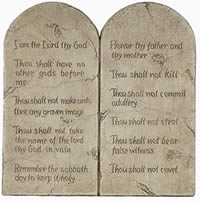 This was in reference to God's laws, the commandments. Caesar's coin, a denarius, was considered blasphemous by the Jews (unlawful) because it had
the "graven image" of a false god, and because the
tax coin included an inscription that said Caesar was the son of a god. This was in reference to God's laws, the commandments. Caesar's coin, a denarius, was considered blasphemous by the Jews (unlawful) because it had
the "graven image" of a false god, and because the
tax coin included an inscription that said Caesar was the son of a god.
So, assuming Jesus knew the commandments, "no other gods", and "Thou shalt not make thee
any graven image (idol), or any likeness", and "Thou shalt not bow down thyself unto them,
nor serve them" (Deuteronomy 5:8)
then would Jesus break the first and, in some translations, second commandment to use Caesar's "graven image", or "serve" or "bow down" to a false god, Caesar, by serving him
a tribute?
Notice, the coin which came from the fish's mouth, and was used by Simon Peter and Jesus to pay tax collectors (Matthew 17) was the Shekel. This coin had the image of Baal, another god. So, this coin also violated the Jewish first commandment - No other gods, and the second commandment - no graven image. It was against God's law to have another god, much less serve another god with a tribute.
Even many years later, John still kept this belief.
"Little children, keep yourselves from idols." - 1 John 5:21
 If Jesus was understood to say "Yes, pay taxes to
Caesar", then why charge him with the crime of forbidding paying taxes? If Jesus was understood to say "Yes, pay taxes to
Caesar", then why charge him with the crime of forbidding paying taxes?
Is it possible for a person to be charged with forbidding paying taxes, if that person has already stated his position (publicly) as "Yes, pay taxes"?
- "Things" that are Caesar's, and "things"
that are God's?

Look all around. Can you find anything which God did not make?
If God made every thing, doesn't every thing
belong to God, including Caesar? Wasn't this the point of Jesus' answer, that everything belongs to God? And, won't everything still belong to God long after Caesar's
greatest grandsons are done using and abusing them?
- If the "King of the Jews" really was for
paying Caesar's taxes, wouldn't he have been Rome's favorite
Jew? Indeed, such a well-followed leader, who was also surrounded by "all" of Rome's tax collectors, would
certainly not have been crucified. Instead, Jesus would have been
made Caesar's chief tax collector in Israel, if Jesus really did say, "Pay Caesar taxes."
Governments do
not destroy their best cheerleaders, it's bad for
business. And, the business owners, i.e. bankers, moneychangers, know it. Governments always borrow from the moneychangers (unless they're rogue nations that avoid central banks) because there would be no "interest" at the banks without doing so. (And thus, ownership of entire nations is revealed, for any who care to know. It's the moneychangers.)

Didn't the "hypocrites" already know "the
way of God in truth," ... that God created and owns
everything? And, didn't they already know all things
belong to God and will still belong to God long after Caesar is done abusing them?
Probably many hypocrites did know, because it was already written in the
Jewish Bible for hundreds of years...
 "The earth is the Lord's,
with all its wealth; the world and all the people living
in it." - Psalms
24:1 "The earth is the Lord's,
with all its wealth; the world and all the people living
in it." - Psalms
24:1
The earth, wealth, and people, are the Lord's,
not Caesar's.
|

"The coin? I rendered it ...to Caesar." |
 In the beginning God
created the heaven and the earth." - Genesis
1:1 In the beginning God
created the heaven and the earth." - Genesis
1:1
God created, everything, including Caesar.
 "the earth is the LORD's."
- Exodus 9:29 "the earth is the LORD's."
- Exodus 9:29
God made all "things," and so all "things" belong to God, including Caesar. Thus Caesar is not god. And, thus, as Jesus said, "the subjects are exempt."
Those who are told Jesus was advocating serving another god, by paying taxes to a Caesar, are simply being mislead by "false prophets".
What Were the Apostles Doing In Jesus' Name?
Peter and the other apostles knew exactly what Jesus meant by "give to God" - that Caesar, a man, cannot be their Lord. After being put in jail for spreading the words of Jesus, they escaped and went right back to teaching the word (and evidently, the word was tax related).
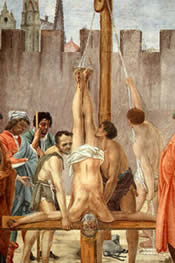 "Peter and the other apostles replied: "We must obey God rather than men!" ... When they heard this, they were furious and wanted to put them to death." - Acts 5:29 "Peter and the other apostles replied: "We must obey God rather than men!" ... When they heard this, they were furious and wanted to put them to death." - Acts 5:29
Notice that some of these interrogators suspected Peter and the apostles might be taking part in the next revolt. And, according to the Bible, revoltion was an ongoing occurrence.
"Men of Israel, consider carefully what you intend to do to these men. Some time ago Theudas appeared, claiming to be somebody, and about four hundred men rallied to him. He was killed, all his followers were dispersed, and it all came to nothing. After him, Judas the Galilean appeared in the days of the census and led a band of people in revolt. He too was killed, and all his followers were scattered." - Acts 5:36
Evidently, Jesus wasn't the only revolutionary leading a tax "revolt", or supporting the first commandment. These revolutions were already happening, before and after Jesus' time.
Multiple Messiahs, and Saviors? "First Revolt of the Jews [...]
The Jews were so oppressed by the Romans that they broke out into revolt several times, but were put down easily ... The first revolt began under the emperor Nero, A.D. 60,
and one of the first war-measures was to issue money to pay soldiers and for the use of the people, who detested the coins of the Romans as blasphemous and badges of servitude.
[...]
The Second Revolt of the Jews [...] In 117 A.D., Hadrian sent a colony of veteran soldiers to Jerusalem, and the revolt broke out there, aided by the cry, "The Messiah has come!" referring to the new leader, Simon Bar-kokab, called "Son of the Star", but the war did not begin until 131 A.D. It was an ancient custom of the Syrian kings and Egyptioan Ptolemies to honor a successful general or a patriotic king and general of the army with the title "SAVIOR" -- in Greek, SOTER -- as seen on coin No.3; the first Ptolemy was a Soter, also the first Demetrius."
- Ancient Coins and Gems of the Period of Time from Alexander the Great to the Destruction of Jerusalem, by A.L. Rawson, LL.D.
Jesus wasn't the only revolutionary Messiah or Savior. It was an ancient custom to honor others with the title "SAVIOR".
But, Peter and the apostles picked up their crosses, as Jesus said to do, and followed him, to join in revolution.
"We must obey God rather than men", which likely included Caesar.
So, why are people told differently on Sunday?
|
"Hmmmm, Things to Caesar,
... things to God?"
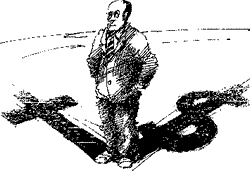
|
|
 What did Jesus think about Bankers, i.e. Moneychangers?
What did Jesus think about Bankers, i.e. Moneychangers?
7. Fractional Reserve Banking?
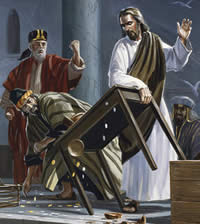
 Jesus "overthrew the tables of the moneychangers"
in the temple, and called moneychangers "thieves." [Mark 11:15, John 2:15, Matthew 21:12] Jesus "overthrew the tables of the moneychangers"
in the temple, and called moneychangers "thieves." [Mark 11:15, John 2:15, Matthew 21:12]
Evidently, Jesus thought bankers are crooks.
And, just what is fractional reserve banking? If you tried to pull-off such a scam, you'd be arrested like a Madoff or Ken Lay.
So, what
happens to people who mess with Big Money? Aren't they set-up?
Judged? Disposed?
Notice Jesus was dead three days after ejecting the moneychangers
from the temple. He was set-up, judged, and disposed.
See Jesus
and the Money Changers on Wikipedia (Thank you, CIA?)
|

"What is Truth? No one can serve two masters."
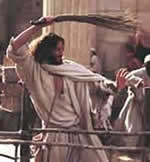
"Moneychanging Thieves!"
|
 What did Jesus teach about money?
What did Jesus teach about money?
8. Treasure in Heaven
Jesus had a problem with money itself, a system of service
to other gods, Mammon, god of riches, and to Caesar. Jesus made it very clear, rich people won't get into heaven.
 "Truly
I say to you, it is hard for a man with much money to go into
the kingdom of heaven. And again I say to you, it is simpler for
a camel to go through a needle's eye, than for a man with much
money to go into the kingdom of God. And the disciples, hearing
this, were greatly surprised, saying, Who then may have salvation?
And Jesus, looking at them, said, With men this is not possible;
but with God all things are possible." - Matthew
19:23-26 "Truly
I say to you, it is hard for a man with much money to go into
the kingdom of heaven. And again I say to you, it is simpler for
a camel to go through a needle's eye, than for a man with much
money to go into the kingdom of God. And the disciples, hearing
this, were greatly surprised, saying, Who then may have salvation?
And Jesus, looking at them, said, With men this is not possible;
but with God all things are possible." - Matthew
19:23-26
Will a camel ever fit through the eye of a needle? Notice, with
the money-system of men "this is not possible".
"And he said to them all, If any
man has a desire to come after me, let him give up all,
and take up his cross every day, and come after me."
- Luke 9:23
 Give up all? Give up all?
"There came one running, and kneeled
to him, and asked him, Good Master, what shall I do that I may
inherit eternal life? And Jesus said to him, Why call me good?
There is none good but one, that is, God. You know the commandments,
Do not commit adultery, Do not kill, Do not steal, Do not bear
false witness, Defraud not, Honor you father and mother. And he
answered and said to him, Master, all these have I observed from
my youth. Then Jesus beholding him loved him, and said to him,
One thing you lack: go your way, sell whatever you have, and
give to the poor, and you shall have treasure in heaven: and
come, take up the cross, and follow me. And he was sad at that
saying, and went away grieved: for he had great possessions."
- Mark 10:17-22

Jesus taught its good to be poor, and bad to be rich.
• "Blessed are you who are poor, for yours is the kingdom of God. ... But woe to you who are rich, for you have already received your comfort."
- Luke 6:20
• "You cannot serve both God and Money." - Luke
16:13
Could any of this explain "Give ... to Caesar the things
that are Caesar's"?
 Jesus was teaching against chasing after money (because
a camel can never fit), and against serving the graven-image-idol-worship money system from the man-god Caesar. And, If Jesus gained too many followers, the result would be less
money available for government tax collectors, and so, less tax
money for the self-described god Caesar. Apparently, the Romans, and the Jewish leadership (temple-taxers and big business men), did not find such teachings desirable.
Jesus was teaching against chasing after money (because
a camel can never fit), and against serving the graven-image-idol-worship money system from the man-god Caesar. And, If Jesus gained too many followers, the result would be less
money available for government tax collectors, and so, less tax
money for the self-described god Caesar. Apparently, the Romans, and the Jewish leadership (temple-taxers and big business men), did not find such teachings desirable.
 Dissenting with Government
Dissenting with Government
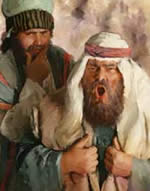 9. The Romans wanted to punish Jesus for a tax crime. But why did the Jewish leadership want him? 9. The Romans wanted to punish Jesus for a tax crime. But why did the Jewish leadership want him?
"Then Jesus went into the temple.
While he was teaching, the high priests and the elders of the
people came to him and asked, "By what authority are you
doing these things, and who gave you this authority?"
- Matthew 21:23
What were the "high priests" so upset about? What was Jesus telling the crowds of people who loved him?
 Don't Go To Church, Pray At Home Don't Go To Church, Pray At Home
The high priests were angry partly because Jesus said people shouldn't go to church to pray.
"And when you pray, do not be like the hypocrites ... in the synagogues ...
But when you pray, go into your room, close the door and pray ... Then your Father, who sees what is done in
secret, will reward you." - Matthew
6:5
 Jesus said don't be like hypocrites.
Hypocrites go to church. Hypocrites even run the church ("Woe to you, teachers of the law and Pharisees, you hypocrites! ... You snakes! You brood of vipers! How will you escape being condemned to hell?"). But, Jesus said, you must go to your room and pray in private in order to be heard and rewarded. Jesus said don't be like hypocrites.
Hypocrites go to church. Hypocrites even run the church ("Woe to you, teachers of the law and Pharisees, you hypocrites! ... You snakes! You brood of vipers! How will you escape being condemned to hell?"). But, Jesus said, you must go to your room and pray in private in order to be heard and rewarded.
He was teaching that churches and priests
weren't needed, and were actually harmful, full of hypocrites, and snakes, who were surely condemned to hell.
Notice, a person can't be at church (paying temple-taxes, and supplying sacrificial church butchers with free food) if they're staying at home to pray. The church leaders were the same as the Romans, demanding of taxes, thus a free lunch, because they chose to serve money.
Such advice, "don't be like" those who go to church, if followed, would have soon depleted a church treasury, and hurt church-business profits.
No taxes, no business. No business, no taxes.
Again, the temple-taxers were displeased with Jesus.
Shortly before Jesus said don't be a hypocrite, he had a custom of going to church. But, the churches tried to kill him. Maybe that is what changed his opinion about going to church, Godless hypocrites.
St. Paul agreed with Jesus, God Is Not At Church
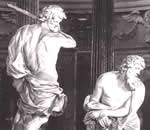 According to Luke, who wrote Acts, Paul took this notion a step further. Paul said God isn't even
at church, and doesn't need anything from human hands, anyway. According to Luke, who wrote Acts, Paul took this notion a step further. Paul said God isn't even
at church, and doesn't need anything from human hands, anyway.
"The God who made the world and everything in it is the
Lord of heaven and earth and does not live in temples built by hands. And he is not served by
human hands, as if he needed anything" - Acts
17:24
Teaching such things to people, who were temple-taxpayers, may have been why Paul was also chased out of towns, and like Jesus and the other apostles, killed by government. Paul appears to have been another cross carrying follower of Jesus, who couldn't obey the government. But he wasn't crucified. Paul was beheaded.
Ransom? The Poor Are Not To Give Less
Jesus' criticism of the synagogue, which included the priesthood and church elders, did not go over well, because it was bad for church business, which was collecting ransom money from the rich and poor.
"each one must pay the Lord a ransom for his life... a half shekel ... The rich are not to give more...
and the poor are not to give less..."
- Exodus 30:15
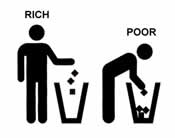 God has spoken. The poor "are not to give less", and so must pay their "fair share" of taxes - to the priesthood and elders. (So much for a graduated tax. Imagine the uproar if God [or Moses] wrote the U.S. income tax law. But, what God says to do for his tribute is exactly what is written in the Constitution by the Founding Fathers.) Today, some priests can fill a stadium with temple-taxpayers. God has spoken. The poor "are not to give less", and so must pay their "fair share" of taxes - to the priesthood and elders. (So much for a graduated tax. Imagine the uproar if God [or Moses] wrote the U.S. income tax law. But, what God says to do for his tribute is exactly what is written in the Constitution by the Founding Fathers.) Today, some priests can fill a stadium with temple-taxpayers.
Why Does God Say He Wants Money?
 Evidently, the first thing God told Moses, up on the mountain, was 'Go, get me some gold and silver.' Evidently, the first thing God told Moses, up on the mountain, was 'Go, get me some gold and silver.'
"The Lord said to Moses, "Tell the Israelites to bring me an offering ... These are the offerings you are to receive from them: gold, silver and bronze..."
- Exodus 25:1
Why does God need gold and silver? Jesus may have asked the temple priests the same question.
 Jesus Insults Priesthood and Pharisees Jesus Insults Priesthood and Pharisees
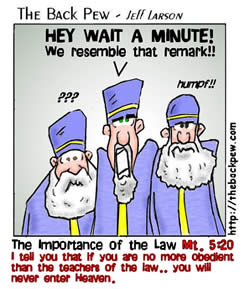 After telling the priests and church elders a parable, Jesus insults them by saying
... After telling the priests and church elders a parable, Jesus insults them by saying
...
"I tell you with certainty, tax
collectors and prostitutes will get into God's kingdom ahead of
you!" - Matthew
21:31
"When the high priests and the
Pharisees heard his parables, they knew that he was talking about
them. Although they wanted to arrest him, they were afraid of
the crowds" - Matthew
21:45
Contrary to Saul's (St. Paul's) message about obeying authorities ordained by God (Romans 13), Jesus himself did not obey authorities (the government), and even mocked them, though they could have arrested
him. Jesus was telling these Jewish authorities they had a lower
status than tax collectors and prostitutes, and that they weren't even necessary for salvation. And, if Paul said, God is not at church and doesn't need the service of humans, it appears he agrees with Jesus - church is for hypocrites.
 So Why kill Jesus? Was it taxes?
So Why kill Jesus? Was it taxes?
- Jesus was officially charged with the crime of "forbidding paying
taxes." Luke
23:2. And, this may have also been applicable to temple taxes, since Jesus also taught against the chuch leaders, calling them hypocrites (Matthew 15:7, 23:13, 23:15, 23:23, 23:25, Luke 11:44, 13:15), and also calling those who go to church hypocrites (Matthew 6:5), and said God rewards those who pray at home.
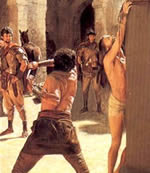 Jesus was teaching his disciples, specifically Simon, that taxes
imposed by kings belong upon "foreigners". And, "the
subjects [children, sons] are exempt." Matthew
17:25-27 Jesus was teaching his disciples, specifically Simon, that taxes
imposed by kings belong upon "foreigners". And, "the
subjects [children, sons] are exempt." Matthew
17:25-27
- Jesus was teaching tax collectors who "were
everywhere in the habit of coming close ... to listen to Him."
Luke 15:1
- Jesus was friends with tax collectors
Matthew 11:19,
and sought them out because he thought they were "sick"
Luke 5:30-31 and wanted to correct their condition.
- Jesus was disrupting tax collections by taking
tax collectors away from their jobs. Luke
19:8 , Matthew
9:9
- Jesus was publicly tested over the subject of "taxes",
by "hypocrites" who possessed and used the Caesar-is-god coin. Matthew
22:15-21
- Jesus disrupted the moneychangers' operations in the temple, thus disrupting
the banking industry. He even called them thieves. Mark
11:15, John
2:15, Matthew
21:12 .... Notice, less banking = less money = less taxes.
- Jesus taught, rich men don't get into
heaven (since a camel will never fit through a needle's eye), and taught against the accumulation of money, and
against the Caesar-god money system... "With men this is not
possible." Matthew
19:23-26, This would also mean less taxes,
and would have resulted in a reduction or even the destruction of the
moneychangers' (i.e. banker's) tax-money-slave system.
- Jesus insulted the chief priests and elders (i.e. local authorities,
local government, the crime partners of moneychangers)
by telling them "tax collectors and prostitutes will
get into God's kingdom ahead of you!" - Matthew
21:31 And, Jesus taught the people that priests weren't necessary; that hypocrites go to church; and that praying should be done at home, instead of church. This would have also insulted the other tax
collectors, those who were perfectly happy with taking other people's money (stealing, against 8th commandment).
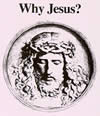
 The problem the authorities had with Jesus was over taxes
(i.e. money). The problem the authorities had with Jesus was over taxes
(i.e. money).
  Jesus was interfering with the Roman internal revenue service,
and teaching 'Roman IRS agents' about their sickness, serving Mammon, the god of riches, instead of God, as written in the first commandment. And the sickness of bowing down and worshipping his idol (coin, graven image), as in the second commandment. And interfering with temple taxes, and their side business adventures with moneychangers and animal products. Jesus was interfering with the Roman internal revenue service,
and teaching 'Roman IRS agents' about their sickness, serving Mammon, the god of riches, instead of God, as written in the first commandment. And the sickness of bowing down and worshipping his idol (coin, graven image), as in the second commandment. And interfering with temple taxes, and their side business adventures with moneychangers and animal products.
Evidently,
Jesus did forbid paying taxes (except "from foreigners").
Jesus was a tax protester, and against serving wealth (mammon), and against
the money system itself. He could not use Caesar's money, whose own coin
declared him to be a god, without breaking the first
commandment, "You shall have no other gods."
 This type of behavior would put Jesus on any government's bad-boy
list.
This type of behavior would put Jesus on any government's bad-boy
list.
|
How can a government get treasure into it's treasury if
there are no taxpayers, no money users, and no one dependent
on the system?
This was a choice of whom to serve...
"Give ... to Caesar the things
that are Caesar's,
and to God the things that are God's."
The system of man wants you - and needs you -
in his system.
|
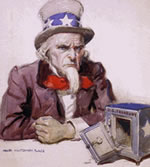
"I want You ...
get back in my piggy!" |
 |
 |
 |
 |
If you think we are the only ones
having this interpretation of Jesus being a tax protester,
see...
 "The Complete Idiot's Guide to Jesus"
by Bell and Sumner, p. 198-199, 2005 Edition. It describes
a similar interpretation of the rendering unto Caesar. "The Complete Idiot's Guide to Jesus"
by Bell and Sumner, p. 198-199, 2005 Edition. It describes
a similar interpretation of the rendering unto Caesar.- Jesus-on-taxes.com
- This website has an entire book, by Ned Netterville, on the subject of
Jesus and taxation. It's titled "Jesus
of Nazareth, Illegal-Tax Protester"
and is free to download. This e-book is filled with
details and analysis, and as the title implies comes
to the same conclusion (there are legal taxes and
there are illegal taxes). Considering that this author
did not data mine the Bible with a computer (or so
we assume), this e-book is amazingly thorough and complete. Ned Netterville's effort, including all those contributing to it, is probably the most important thing written about Jesus since his words were first recorded. (Do not continue through life without reading this e-book, because your 501(c)3 church is failing you, greatly.)
- "Rabbi Jesus", a book
by Bruce Chilton, p. 202, April 2002 Edition. Chilton
also indicates Jesus meant that all locals "should
be free of taxes" - though he attributes
Jesus' statement to an issue of Temple taxes instead
of the actual question, which was about tolls or tributes to "kings on the earth"
...
"He [Jesus] is telling his preeminent
disciple [Simon/Peter] that all Israelites, as sons
of a king, should be free of taxes for the Temple,
and that those who collect such taxes can, in effect,
go fish for them." - Rabbi Jesus
- Other interesting observations can be read in the
online encyclopedia, Wikipedia: http://en.wikipedia.org/wiki/Render_unto_Caesar. Also use Archive.org to see older versions of this Wiki page (because
all tax related topics on Wiki are highly censored, by ... Guess who?)
- Probably the most significant interpretation, also
found on Wikipedia, is this amazing take on the "Render
unto Caesar" moment...
"A second time when asked about Roman
taxes Jesus doesn't produce a Roman coin but asks
his opponents to. They are able to produce one complete
with its idolitrous image and blasphemous inscription.
Having once again exposed his opponent's divided
loyalties [by having them produce a idolitrous,
blasphemous coin] he responds that those who
are Caesar's should be given to Caesar and those
who are God's should be given to God."
http://en.wikipedia.org/wiki/Jesus_and_the_Money_Changers#Jesus.27_authority
(You may need to copy this address into Archive.org to find this one)
* Notice, this interpretation renders people
loyal to Caesar to Caesar, and people loyal
to God to God. Money may not have even been
the object of Jesus' answer. Considering
Jesus was trying to save people, and wasn't very fond
of money [Mark
10:23, Matthew
19:24], this is possibly the most accurate interpretation.
|
 |
 |
 |
 |
Our
emperor, Fraud, stands naked.
"But he has nothing on!"

Watch
Uncle Sam dance
for Mammon. (Warning: For Adults Only) |
 Jesus said... Jesus said...
"You cannot serve both God and Money." - Luke
16:13
According to Jesus, we have two choices: Either serve the god of riches - i.e. Caesar's system (Money),
or God. Since Jesus said no one can serve two masters, what did he say we should do?
"You shall worship the Lord your God, and you shall serve him
only."
- Matthew 4:10
Notice, Jesus set an example for us to follow, and truth is the religion...
"I am the way, and the truth, and the life; no one comes to the Father but through Me."
- John 14:6 |
Apparently, if we live by the truth, by serving only one God, we just might make it to the Father in Heaven.
According to Jesus, it is impossible to serve a god like Caesar,
to give him your time, hard labor and taxes, and to also serve
God.
The Pharisees disciples who tested Jesus were not stumped by his answer. Everyone present understood what Jesus meant by "render", because they all knew (what every Bible hides from the world), that the tax coin said Caesar is son of god. And notice, Jesus was still charged with
forbidding taxes.
 Why might Jesus have forbidden paying taxes to "kings on the earth" (i.e. governments)?
Why might Jesus have forbidden paying taxes to "kings on the earth" (i.e. governments)?
 Slavery
Slavery
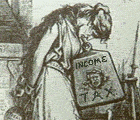 Jesus knew that people were having their land and property taken,
and even having their children taken as slaves, if they did not
pay taxes. Such tax slavery was written about some 400 years
before Jesus... Jesus knew that people were having their land and property taken,
and even having their children taken as slaves, if they did not
pay taxes. Such tax slavery was written about some 400 years
before Jesus...
"We have borrowed money for the king's tax on our fields
and our vineyards... we are forcing our sons and daughters to
be slaves, and some of our daughters are forced into bondage already,
and we are helpless because our fields and vineyards belong to
others." - Nehemiah
5:4-5
Taking children was done by many cultures. In the case of males,
to be taken while still young, then indoctrinated into the tyrant's
fighting force, or enslaved. In the case of females, to be taken
as additions to harems for the rulers, or as army prostitutes,
or also enslaved. In recent times, the Japanese were accused,
by their now elderly victims, of taking women as prostitutes for
their military.
Did yo notice, it's the Income tax and Property tax that are being mentioned here? This is happening today. You've all sold your children, even your great, great grandchildren, into slavery, since it will take generations to pay off the trillions of dollars stolen by banker bailouts (currently over 23 trillion dollars).
Most people will choose to serve the god Mammon, and chase after money; having been trained to do so from birth (i.e. "go to college, be successful"). And to gamble in casinos called stock markets, expecting profits without actually performing labor. And, now the U.N. will become a global IRS, squeezing you for your carbon credits, with a cap and trade bill, simply for the privilege of existing, and for your government "healthcare". (You will be forced to take your shots, or to run, like Logan's Run)
 Seized Property and Land
Seized Property and Land
 Jesus also knew that a Caesar would spend his "tributes"
(taxes, seized property, land) on war, oppression, and building
monuments to himself, son of god. To get a good, graphic
idea of what forced tax payments were like in Jesus' time, see
the movie The Nativity
Story. To read about some modern-day examples of forced tax
collections, just search the Internet for "IRS raid". Jesus also knew that a Caesar would spend his "tributes"
(taxes, seized property, land) on war, oppression, and building
monuments to himself, son of god. To get a good, graphic
idea of what forced tax payments were like in Jesus' time, see
the movie The Nativity
Story. To read about some modern-day examples of forced tax
collections, just search the Internet for "IRS raid".
According to non-Christian, Roman historians, some people were
even put to death when they could not pay Caesar's tax. Likely,
these were some of the people that ended up on crosses, and fed
to lions in a Roman coliseum. Maybe Christians were preferred as
lion food because, at the time, they were still living by Jesus'
teaching, to serve one master, God, and they refused to pay Caesar his tribute.
|  War
War
What does a 'Caesar' do after taking your tax money? Isn't
war frequently one of "the things that
are Caesar's"? Over the last 100 years, the United
States alone has been averaging one war for every 16 years. The last serveral "wars" weren't even declared by Congress, the only ones legally able to do so, thus they were illegal actions, just invasions for the god of mammon.
And, all these wars are just scams of merchants and mercenaries. No need to believe us dumb data miners. Just Google "War is a racket" by General Smedley Butler. It's now a free online book.
This doesn't even include the smaller military actions, such as
bombing
Serbians, the Iran-Contra
'affair', or the invasion of Panama and the capture of Panama's
leader, Noriega. (When Noriega was asked, "who is your drug dealing partner?", he said, George Bush)
|

Warning: This is very graphic, but then you have
already played your part and payed tribute for this, and even sacrificed your own sons and daughters. (Google "War is a racket" by General Smedley Butler)
If any links have disappeared, copy the address into Archive.org |
 Thou shall not kill
Thou shall not kill
Every creature is born with the right to kill anything that is coming to kill it. Aside from that, what part of this don't people understand. If we give tributes to a 'Caesar', haven't we then enabled him
to conquer others with deadly force? Haven't we then become an accomplice, part of
the killing, and so, violated the commandment "Thou shall
not kill"?
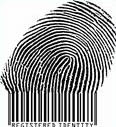 Yes. We do kill, and pay for death, with our taxes. The funder
of death is as guilty as the trigger man. Thus, all taxpayers are useful idiots. Yes. We do kill, and pay for death, with our taxes. The funder
of death is as guilty as the trigger man. Thus, all taxpayers are useful idiots.
Look into your mirror to see destruction incarnate. Your fingerprints
are found all over the tribute money, and the murder weapon. You've labored hard for it, too.
But, not everyone is with you.
"We are war tax resisters because we have discovered
some doubt as to what belongs to Caesar and what belongs to God,
and have decided to give the benefit of doubt to God."
- Pastor John K. Stoner

Pastor Stoner has apparently not been drinking his fluoride
water, or taking his vaccinations.
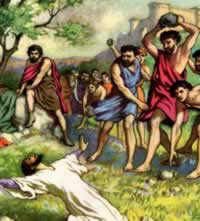 The
question is "Who would Jesus Tax?" - Not Paul,
or anyone else. The
question is "Who would Jesus Tax?" - Not Paul,
or anyone else.
- Romans 13 was written by Paul (Saul), a Roman citizen.
- Paul, like many Romans, was dedicated to wiping out followers
of Jesus (e.g. stray tax collectors, prostitutes, sinners,...)
- PBS.org
- Paul (Saul) played a part in the stoning murder of Stephen.
- Acts 7:58 (Apparently, he ran the coat check for Stephen's killing.)
- Paul was not quoting Jesus in Romans 13:1-13:7.
- Paul was not one of Jesus' 12 disciples.
- Jesus never even knew Paul, though Paul claimed otherwise.
- Paul was arrested and put in prison. (So, Paul, like Jesus, didn't
obey the "higher authorities", either.)
- Half of the New Testament was written by this Roman Paul. -
Bible,
Wiki
For more on Paul, see http://en.wikipedia.org/wiki/Paul_the_Apostle
It appears Paul may have written Romans to benefit "authorities".
"be in subjection to the higher authorities,
for there is no authority except from God, and those who exist
are ordained by God" - Romans 13:1 (WEB)
Paul wrote this, Jesus did not.
Paul served the "government", working as a bounty hunter of followers of Jesus.
One bible translation explains Paul like this,
"If you owe taxes, pay them. If you owe toll, pay them.
If you owe someone respect, respect that person. If you owe someone
honor, honor that person" - God's
Word.
But, what if you don't owe any of that?
If you don't owe - then you don't owe! ... When nothing is due, nothing is due.
Who do we actually owe? Does God approve of government authorities
who are tyrants, such as Hitler, Stalin, or the Communist
Chinese government? Are tyrants "the higher authorities"
which we must be "in subjection to", because they're
ordained by God?
The Founding Fathers of the United States were very religious,
but even Thomas Jefferson, the third President and chief author
of the Declaration of Independence, said, "Resistance
to tyrants is obedience to God." (So, Here we have an example
of someone ordained by God, the 3rd President of the United States,
Thomas Jefferson, saying it is obedience to God to resist tyranical
government.) Isn't this exactly what Jesus and his disciples were doing? They were killed by tyranical government.
If Paul really did write Romans 13:1-13:7, then why did the
Romans kill him? Wouldn't such words, which render to Caesar
obedience and taxes, have made Paul one of the Emperor's favorite
citizens, much like Jesus would have been, if He really was rendering things (tax money) to Caesar?
It seems Paul himself did not actually practice obedience to authorities,
because he was imprisoned by higher authorities, and eventually
killed by higher authorities.
Notice Paul also exposed Peter as an outlaw...
"He [Paul] utterly opposed any idea that the law was
binding on Christians, declaring that even Peter did not live
by the law."
See http://en.wikipedia.org/wiki/Paul_of_Tarsus#Arrest_and_death,
and see Gal 2:14.
Why should people accept Romans 13:1-13:7, believing subjection
and obedience to authorities is Christ-like, when Jesus, and
nearly every apostle, was killed by the higher authorities, including
Paul.
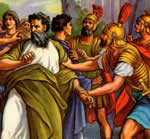
"be in subjection to the higher authorities" - Romans
13:1 (WEB)
Perhaps Paul wrote this after he was sent to prison.
Evidently, Paul did learn something from Jesus, since he wrote in 1 Timothy 6, "the love of money is the root of all evil." And so, the solution was, in other words "Render unto Caesar that which belongs to Caesar."
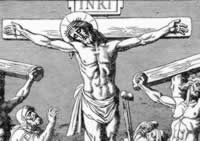
"Would you like to live without being afraid of the authorities?
Then do what is right, and you will receive their approval."
- Romans
13:3 (ISV)
Translation: Do what you are told, if you don't want any trouble.
Too bad Paul couldn't warn Jesus about this, since he never actually met Jesus.
Read what happened to the apostles...
Subjection is forced ... by governments & their tax collectors
| Service +
Force = Compliance
- 1040
Instructions, 2004
"To protect the honest
taxpayer, we have strengthened enforcement of the tax laws."
-IRS Commissioner, Mark W. Everson

"...everyone who
does evil hates the light, and doesn't come to the light,
lest his works would be exposed." - John
3:20-21

|


Notice Nazis also wore black.
Was this government "ordained
by God"?

Homeland Security? |
"You devour widow's houses and
say long prayers to cover it up. Therefore, you will recieve greater
condemnation." - Matthew
23:14
Those who use force to take "taxes" are violating
well established laws.
Pilate asked him, saying, Are
you the King of the Jews? And he answered him and said, You say
it." - Luke 23:3
Notice, Jesus didn't admit to Pilate he was a King. Jesus only
said, "You say it". (Only 3 of 14 Bibles, or
21%, say Jesus answered "yes" to this question). Evidently,
Pilate didn't care if Jesus thought he was a king, since even
Jesus admitted he wasn't a king in "this world" ...
 "My kingdom is not of this world." - John
18:36
"My kingdom is not of this world." - John
18:36
And Pilate said to the chief priests
and the people, "In my opinion this man has done no wrong."
- Luke 23:4
So, if Jesus really did confess to being a king, then why did Pilate say, "this man has done no wrong"?
Obviously, claiming a kingship over Jews was not the reason Jesus was whipped and executed. It had to have been one of the other charges against him, perverting the nation, or forbidding paying taxes.
[Also notice, Jesus was preaching for three years, but was not arrested by the government
until he threw the moneychangers out of the temple. Three days
later Jesus was dead.]
When Pilate found out Jesus was from Galilee
he sent Jesus and his accusers to Herod, the ruler of Galilee.
But, Herod also found Jesus not guilty and returned him
to Pilate. Apparently, Herod didn't care either if Jesus wanted
to be a king. And, when Jesus was returned to Pilate, he again
pronounced Jesus not guilty.
Also agreeing Jesus was innocent was Pilate's wife...
"Have nothing to do with
that righteous Man; for last night I suffered greatly in a dream
because of Him." - Matthew
27:19
But the chief priests continued to demand that Jesus be killed.
So, Pilate got some water and washed his hands, literally, in
front of the crowd, of any responsibility for killing Jesus.
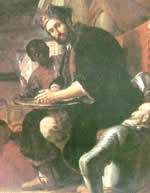 "I am innocent of the blood of
this righteous person. You see to it." - Matthew
27:24
"I am innocent of the blood of
this righteous person. You see to it." - Matthew
27:24
Notice, Pilate and his wife both said Jesus was righteous.
So, after Pilate said, several times, he saw no reason to punish
Jesus, he then has him scourged, which is worse than an ordinary
whipping.
Why would Pilate scourge Jesus, after he just said "I
can't find this man guilty of any crime"? Such harsh
punishment wouldn't fit the crime, if he "has done no
wrong."
Why would Pilate change his mind?
Pilate's primary concern, at least one of them, was getting tribute-tax-money-property
into Caesar's treasury. And, all bureaucrats, including Pilate
know, those who don't perform as expected soon lose their jobs.
Did Pilate hear new testimony about Jesus? Maybe some testimony from
a few of the tax collectors - that Jesus was indeed teaching tax
collectors to not pay taxes? If so, Pilate would
have heard that his tax collectors were neglecting to collect
taxes, in order to follow Jesus. This might explain why Pilate
changed his mind, from declaring Jesus not guilty, to then having
him scourged.

Was Pilate's question "What is truth?" concerning
Jesus and taxes?
- Fact: Jesus was charged with "forbidding paying taxes".
Luke 23:2
- Fact: Jesus taught "the subjects [children, sons] are exempt."
And, that "kings of the earth" should instead collect taxes
from "foreigners." Matthew
17:25-27
- Fact: Jesus was teaching to tax collectors.
Luke 15:1
- Fact: Jesus was friends with tax collectors Matthew
11:19, and He sought their company in order to heal their sickness.
Luke 5:30-31
- Fact: Jesus interfered with tax collectors work.
Luke 19:8 , Matthew
9:9
- Fact: Evidently, being the right person to ask, Jesus was tested
specifically about paying taxes. Matthew
22:15-21
- Fact: Jesus overthrew the tables of moneychangers, disrupting banking,
and thus, taxes. Mark
11:15, John
2:15, Matthew
21:12
- Fact: Jesus was against Caesar's money system, because it was harder
("impossible") for the rich to enter into
heaven - "Who then can be saved?" Jesus looked
at them and said, "With men this is impossible".
Matthew
19:23-26 If there was less wealth to tax, Caesar's taxes
(his pile of money) would shrink.
- Fact: Jesus insulted the chief priests and elders (i.e. government
authorities, the crime partners of moneychanging thieves) by
telling them "tax collectors and prostitutes will get
into God's kingdom ahead of you!" - Matthew
21:31 He said this even though they could have arrested
him. And, this would have also insulted all the tax
collectors who were completely happy taking other people's money.
 Result: Guilty Result: Guilty
Jesus was found guilty of a tax crime. Forbidding paying
taxes is what put Jesus on the cross. And so, he was killed by Pilate
over money (what else). By convincing people
to give (render)
Caesar's false-god money system back to Caesar, Jesus was "perverting
the nation."
"...To Caesar the things that are Caesar's."
For this he was beaten, scourged, given the walk-of-shame,
and slowly executed.
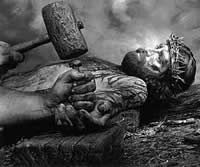
 Jesus
was a tax protester who would not serve Caesar's tax-money-slave system. Jesus
was a tax protester who would not serve Caesar's tax-money-slave system.
Wouldn't Good
Friday be a better national tax due-date in the United States,
instead of April
15, as a reminder to all the slaves - Thou shall not resist?
Who would Jesus tax?
Is this what really happened?
Pilate: "What is truth?"
Jesus: "The subjects are exempt. You should only tax foreigners."
Pilate: "I'm going to crucify you!"
If you can find a Bible translation which quotes Jesus
teaching something different about taxes, contact
us and we'll add it here.
The Subjects are Exempt. Tax
Foreigners.
"In God We Trust?"
 What would the Founding Fathers do? What would the Founding Fathers do?
 It's well known the USA began as a tax revolt by Christians. It's well known the USA began as a tax revolt by Christians.

 Where is the list of "taxable income" actually written in U.S. tax law?
Where is the list of "taxable income" actually written in U.S. tax law?
 The
list of taxable income from U.S. Income Tax law is located in Title 26, CFR Sec.
1.861-8T(d)(2)(iii). It's a list of taxable items
and prescribes that only a "foreign taxpayer"
and "Foreign earned income" are taxable. It
is written immediately after the legal definition of "exempt
income" (excluded income). The
list of taxable income from U.S. Income Tax law is located in Title 26, CFR Sec.
1.861-8T(d)(2)(iii). It's a list of taxable items
and prescribes that only a "foreign taxpayer"
and "Foreign earned income" are taxable. It
is written immediately after the legal definition of "exempt
income" (excluded income).
To find this list, simply go to the US Government's Electronic-CFR:
http://ecfr.gov
- Click 'Simple Search' (on left side)
- Enter 26 for Title number
- In search box enter: income that is not considered tax
exempt
- Click 'submit search' button.
 Result: Section 861
Result: Section 861
Fact: All fundamental income tax instructions
are written in Sec. 861, including...
- how to determine taxable income
- eliminated income
- eliminated items
- excluded income
- income that is exempt or excluded
- the sources of income for purposes of the income tax
- specific sources
- specific guidance
- deductions to gross income
- exempt income (defined)
etc, etc ... There are many more, just examine the rest of this website
Only one section in the Code of Federal Regulations lists
the "income that is not ... exempt" (a.k.a. taxable income). Read the list. It's just one of many things
you can find in the "code" with your computer.
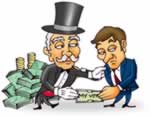 Why
isn't the list of taxable items written up front in Sec.
1, but instead hidden hundreds of sections later in Sec. 861? Why
isn't the list of taxable items written up front in Sec.
1, but instead hidden hundreds of sections later in Sec. 861?
You'll find that U.S. Income tax is fraudulently implemented
by politicians and bureaucrats (high priests, scribes), and bankers
(money changers).
The US Tax Code (26USC) and Regulations (26CFR)
have been data mined, and the result is Sec. 861. Read it.
Confirm it. Ignorance is no excuse. To learn more about
data mining tax code, start with these...
 So, How does such massive fraud happen without being noticed? You'll
find many "tax experts" don't even read tax
law. In fact, tax experts follow Publications,
which are printed by the IRS. These Publications tell
your expert what to do, and how to do it. The "experts", in fact,
know very little about their own expertise, or laws. They simply obey Mafia (organized crime) instructions. So, How does such massive fraud happen without being noticed? You'll
find many "tax experts" don't even read tax
law. In fact, tax experts follow Publications,
which are printed by the IRS. These Publications tell
your expert what to do, and how to do it. The "experts", in fact,
know very little about their own expertise, or laws. They simply obey Mafia (organized crime) instructions.

Don't believe it? Just visit any tax preparation business and
ask if they have the US Tax Regulations (26CFR), or the Internal
Revenue Code (26USC), or... if they just use IRS Publications.
It's very
likely none of the tax prep operations use Publications anymore. Now, they can simply
rely on tax software, fraudulently written, to locate the amount
of tax "imposed" - software which completely ignores the object called "Exempt income".
Test Your Tax Expert!
Why not? They work for you, see if they know what they're doing.
You don't even have to make the test difficult. Simply ask your
tax expert...
 "Where is Exempt income defined?"
"Where is Exempt income defined?"
If your tax expert doesn't know, then show them the answer...
 Answer: Section 1.861-8T(d)(2)(ii) and (iii)
Answer: Section 1.861-8T(d)(2)(ii) and (iii)
Then, tell your expert to search for your "excluded
income". It's their job. They get paid to know the law,
and to save you money with deductions and excluded income.
Did you know that data mining can be done in all 48 Titles of
Law, and in every country which uses codification?

Leb
wohl, Konsortialführer! Der schwindel is over. The jig
is up.
All of your houses will fall.
* Please report any errors using "found error" in your email subject line. Thank you.
|



